GW4 Diversity in Physics Conference
12 November 2020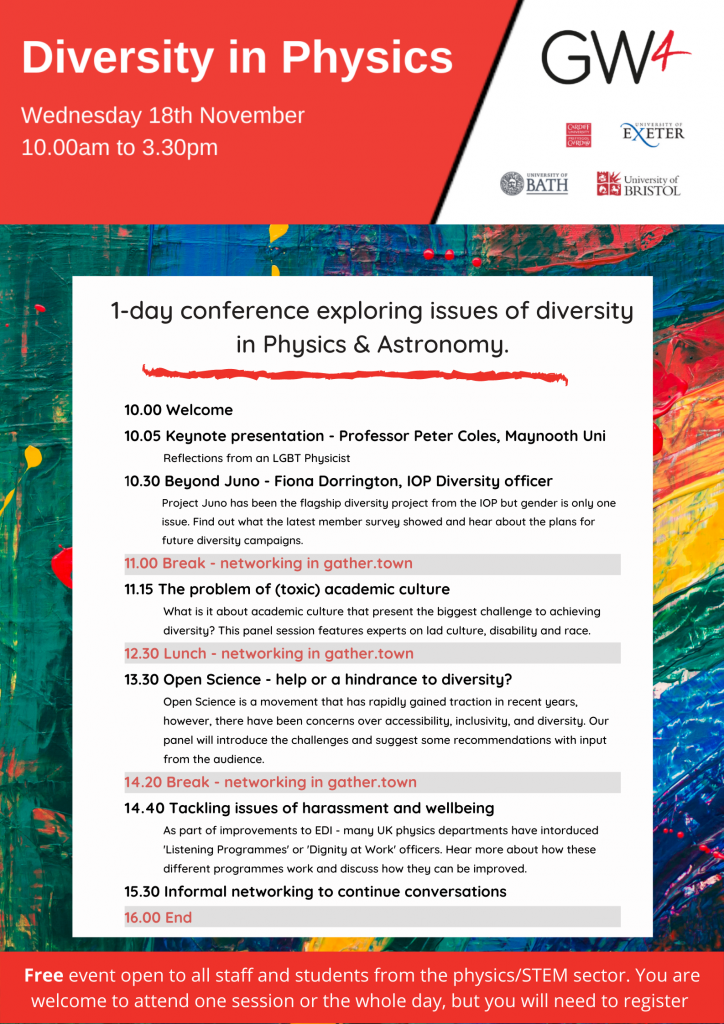
The Physics and Astronomy departments of the GW4 network* hosted a free 1-day online conference to mark LGBTQ+ STEM Day 2020. Aimed at staff and students from the physics sector we discussed the many dimensions of diversity, and how we can tackle the barriers that still exist. The programme featured speakers on topics such as Lad Culture, Open Science, Colonialism in the curriculum, Harassment and bullying and an opportunity to hear about the Institute of Physics’ latest member survey and their strategy for diversity beyond Project Juno. The full programme is attached.
Sessions were held on Zoom with plenty of chance for questions, chat and discussion, and an informal networking space was made available (using gather.town) over lunch, and for the last 30 minutes of the day to help participants keep the conversations going.
*GW4 is a collaboration between Bath University, Bristol University, Cardiff University and Exeter University
Speakers
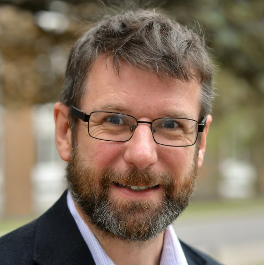
Prof Peter Coles, Head of Dept of Theoretical Physics, Maynooth University. Pronouns: he/him
Peter Coles is a theoretical cosmologist who over the years has worked at the University of Sussex, Queen Mary (University of London), the University of Nottingham, and Cardiff University; from 2017 he worked part-time at Cardiff and Maynooth and moved to Ireland full-time in 2018. He is a Fellow of the Royal Astronomical Society and of the Institute of Physics and has served on the Council of the Royal Astronomical Society and the Diversity & Inclusion Committee of the Institute of Physics. He has been openly gay throughout his academic career and gave a keynote talk at the 2019 LGBTQ+ STEMinar in London. His primary research interest is the large-scale structure of the Universe, specifically on theoretical models that try to account for the properties of the observable universe, including the cosmic microwave background and galaxy clusters, about which he has written 140 refereed journals papers and several books, at technical and popular levels, including Cosmology: A Very Short Introduction (OUP).
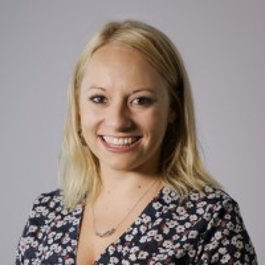
Fiona Dorrington, Diversity Officer, Institute of Physics (IOP). Pronouns: she/her
Fiona has a wealth of experience from her background in diversity and inclusion in the charity sector. Before joining the IOP she managed national and international programmes, spending time in South Africa and southern India on gender equality projects. Fiona joined the IOP in 2018, and has been working as part of the diversity and inclusion team. Since joining, Fiona has been instrumental in researching and advising on diversity and inclusion issues, creating programmes, training and best practice to support staff and members alike. Outside work, Fiona enjoys running and cycling, travelling (outside of a pandemic) and volunteering with mental health charities. She is also a member of several professional networks that focus on females interested or involved in international development.
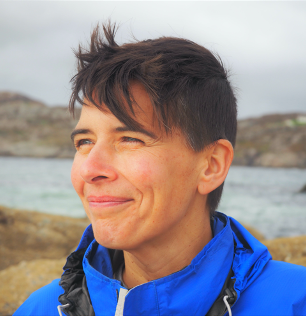
Prof. Carolyn Jackson, Professor of Gender and Education, Lancaster University. Pronouns: she/her
Carolyn Jackson is Professor of Gender and Education in the Department of Educational Research at Lancaster University. She is also Associate Dean for Equality, Diversity and Inclusion (EDI) and People in the Faculty of Arts and Social Sciences. Her most recent book, co-authored with Vanita Sundaram and published by Routledge in 2020, is entitled ‘Lad Culture in Higher Education: Sexism, Sexual Harassment and Violence’.
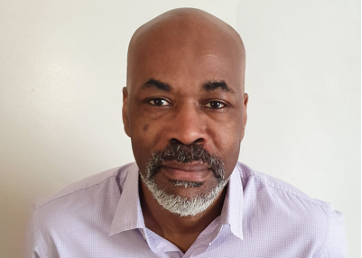
Dr Winston A. Morgan, Reader in Toxicology and Biochemistry, University of East London. Pronouns: he/him
Winston is a Reader in Toxicology and Clinical Biochemistry and also Director of Impact and Innovation in the school of Health Sport and Bioscience at University of East London. He is also involved in research and scholarly activity into factors particularly race which determines societal outcomes in medicine, education and wider society. He has written or contributed to numerous articles including in the Guardian, The Times, The Conversation and the BBC on the intersection of race, ethnicity genetics and other societal outcomes.
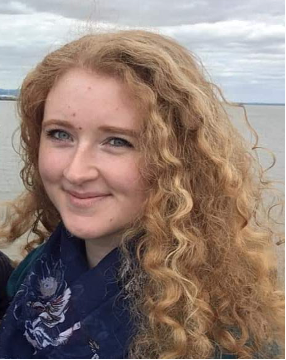
Rhiannon Lunney, PhD Student, School of Physics & Astronomy, Cardiff University. Pronouns: she/her
Rhiannon Lunney is a current PhD student at Cardiff University, studying the theory of interactions of quantum dots and light at low temperatures. Due to her own experiences of developing a disability during her undergraduate, she’s a passionate advocate for an intersectional approach to diversity initiatives and universal design for teaching. This may be the only time you see her without knitting in her hands.
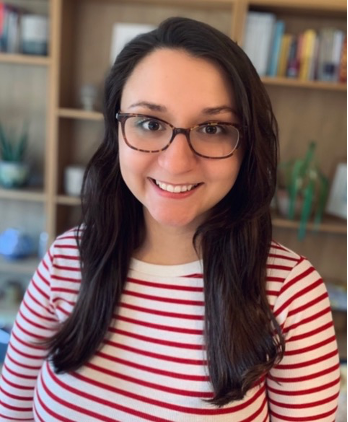
Maddie Pownall, University of Leeds. Pronouns: she/her
Madeleine Pownall is a doctoral researcher in Social Psychology at the University of Leeds. Her work broadly focuses on addressing social inequalities and stereotypes. More recently, she also researches best practice in psychology teaching and learning. She is an advocate for embedding Open Science into teaching.
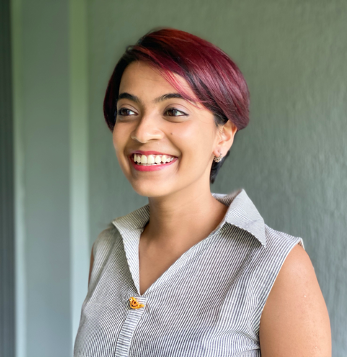
Dr Kohinoor Darda, University of Glasgow/Macquarie University.
Pronouns: she/her
Kohinoor Darda is a postdoc at the University of Glasgow, and Macquarie University, Sydney, investigating social interactions, experience-dependent plasticity, and neural mechanisms underlying art experience. She is passionate about Open Science, and is an Indian classical dancer who loves integrating science and dance in both her scientific and choreographic endeavours.
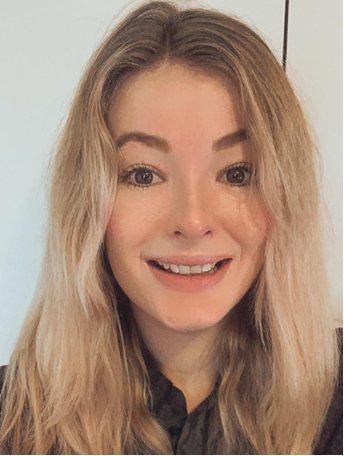
Dr Catherine Talbot, Bournemouth University. Pronouns: she/her
Catherine Talbot is an early-career lecturer in Psychology at Bournemouth University and a committee member of the British Psychological Society Cyberpsychology Section. Her research examines how technologies can be developed to foster wellbeing and promote social inclusion among vulnerable groups. Catherine is interested in developing an approach to Open Science that is ‘open’ to all.
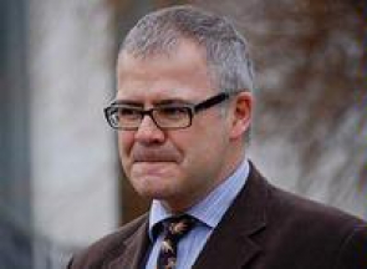
Prof Andrew Norton, Open University. Pronouns: he/him
Andrew Norton is Professor of Astrophysics Education and Deputy Head of School in the School of Physical Sciences at the Open University, where he has worked since 1992. His Deputy HoS role focusses on line management and staff support, including mentoring, probation, staff development, merit awards, promotions and internal communications. He is a registered Public Engagement Ambassador for the National Co-ordinating Centre for Public Engagement and also a registered STEMNET Ambassador. He was co-author of the OU’s ‘60 second adventures in astronomy’ videos and has written over twenty online articles for the OU’s OpenLearn website and for the Conversation website, on topics ranging from the science of Dr Who and Star Trek to exoplanets, supernovae, and black holes. In 2011, he had a fully illustrated book for young children published about exoplanet science.
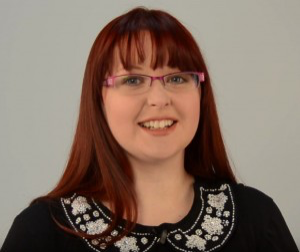
Stacey Habergham-Mawson, Liverpool John Moores University. Pronouns: she/her
Stacey is a lecturer and project manager at Liverpool John Moores University. She has been engaged with the departmental EDI agenda for 6 years, previously chairing the departmental EDI committee. She is also a member of the RAS Committee for Diversity in Astronomy and Geophysics, formally chairing this group from 2017-2019.
Astrophysics Research Institute (LJMU) Listeners scheme has been running since May 2019. Its aim is to prevent bullying and harassment by intervening early. The listeners provide an outlet for staff and students to raise complaints, conflicts or concerns with signposted individuals. The idea is then to informally try and address these before things escalate. By providing advice and information; a supportive environment; identification of allegations which need reporting to the appropriate authorities.
Prof. Emyr Macdonald, Cardiff University. Pronouns: he/him
Emyr was the chair of the ED&I committee in the School of Physics and Astronomy at Cardiff for three years 2015-18. When he was appointed, a recent staff survey had indicated an unacceptably high fraction of staff had either experienced bullying or harassment in the previous year or would not feel able to report bullying. Following wide consultation, this led to initiating a team of Dignity at Work contacts within the school, which was later adapted as a University-wide initiative.
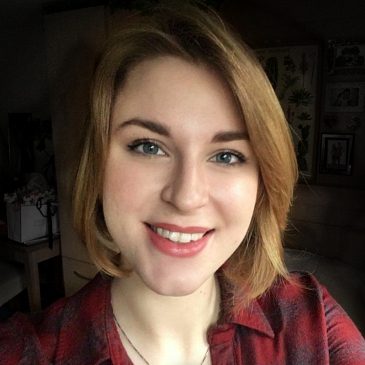
Beth Pitcher, EDI Advisor, University of Exeter. Pronouns: she/her
Beth is an Equality, Diversity and Inclusion advisor at the University of Exeter focussing on race equality and supporting the science colleges. We have had a Dignity and Respect Network for over ten years which helps us to tackle harassment and bullying on campus through their support and listening service
Video recordings of the conference
You can access the recording of each talk using this link with chapters to help you locate specific speakers: https://cardiff.cloud.panopto.eu/Panopto/Pages/Viewer.aspx?id=c8eed152-72dd-448b-a667-ac7701316261
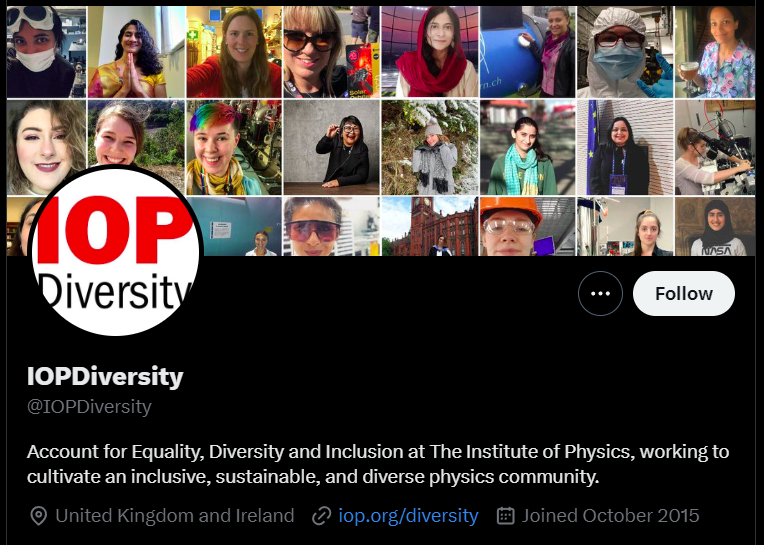
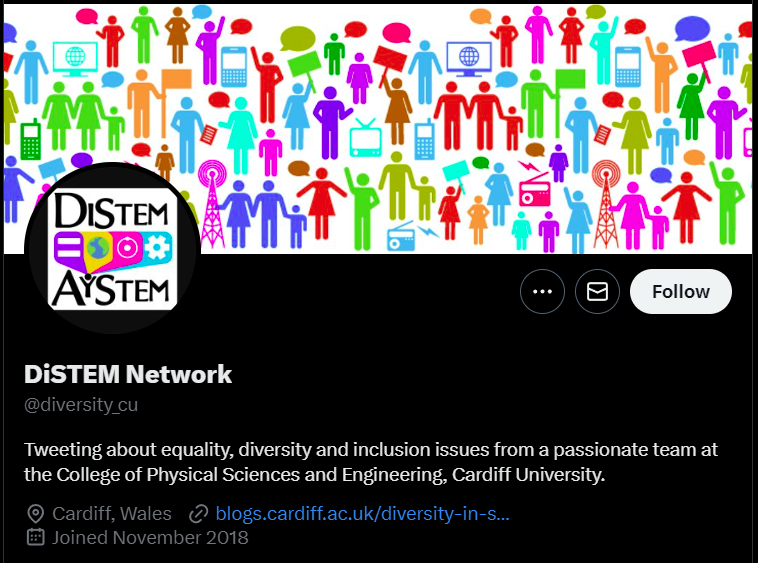
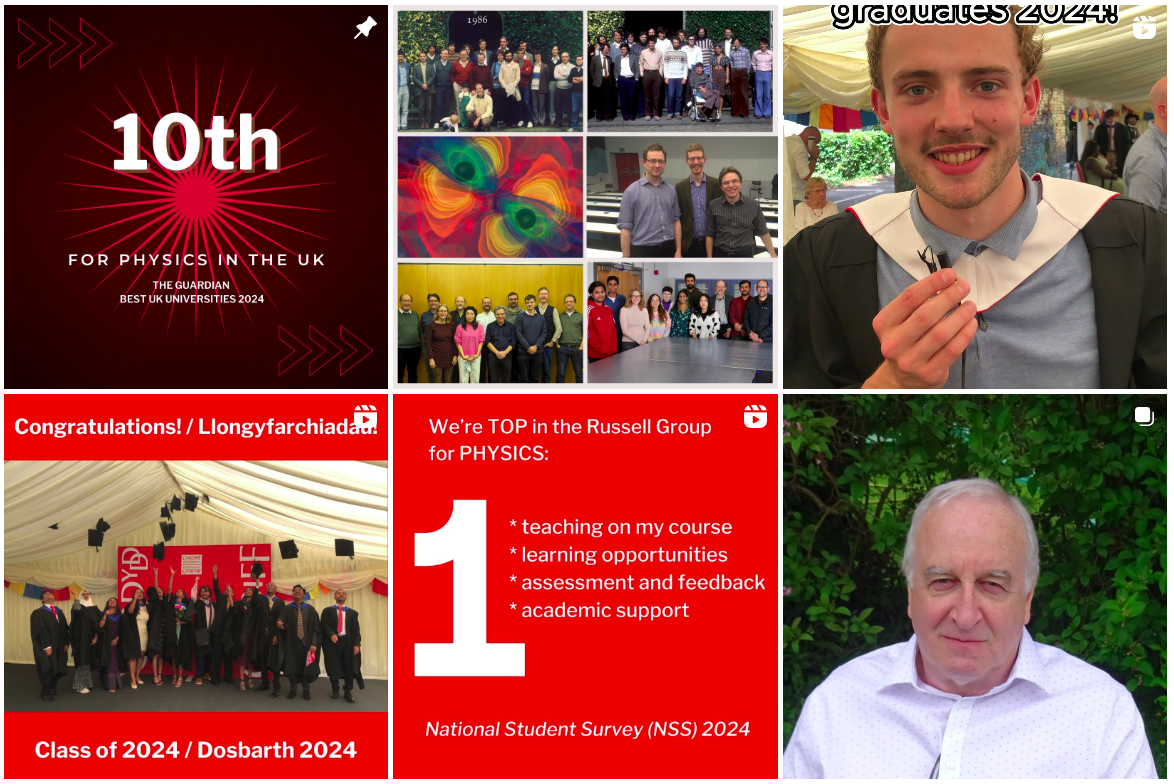
2 comments
Comments are closed.